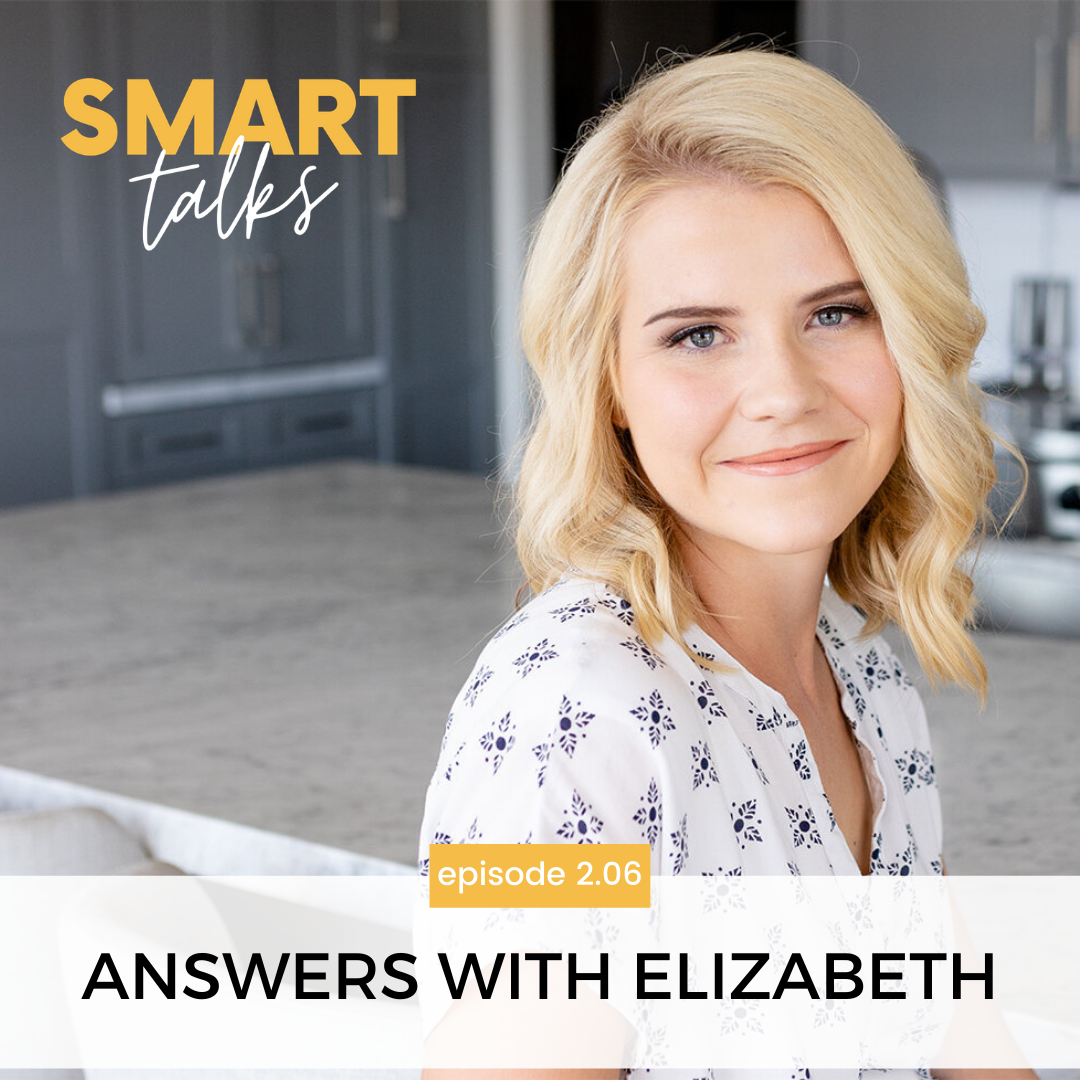
SHOW NOTES
Follow Elizabeth on Instagram and Facebook.
Follow Elizabeth on YouTube for more answers to your questions.
Follow the Elizabeth Smart Foundation on Instagram and Facebook.
Chat 24/7 with the National Sexual Assault Hotline.
TRANSCRIPT
Elizabeth Smart: Hello everyone and welcome to another episode of Smart Talks by the Elizabeth Smart Foundation. I am Elizabeth Smart, and today's a little bit different than our usual podcasts with the guest. Today is just me answering questions that we've received through our social media and our email. And so you get to hear just from me today.
[00:01:15] And just starting right off at the beginning, a lot of the initial questions surrounded or were about recovery questions. So just starting right off at the top. One of the first questions is, "did you ever relapse in your recovery?" That's I feel like a pretty, I guess in my mind I don't know a hundred percent how to answer this, but I feel like I certainly had ups and downs.
[00:01:47] I don't ever feel like I went back and completely started at the beginning again. And I feel like for me, recovery is, I don't know, it's kind of an ambiguous term because the longer that we live, the more things that we experience and to some extent, I feel like we're always recovering from something.
[00:02:11] So have I had days where I felt really bad about things? Absolutely. Have I had days where I felt really happy about things? Yes. I mean, has something else new come up that causes me to cry? Yes. Do sometimes when, sometimes when my flood gates open whether it's because I stubbed my toe and I'm crying, does it make me cry about other things occasionally? Yeah, it does. But I don't feel like I've gone backwards. I don't know, I guess in my mind for myself, I don't feel like it's possible to go backwards because life keeps moving forward, if that makes any sense. I mean, I can't rewind time and change the past, so I just, I can't, I mean, I can feel bad. Of course I can have my down days, but ultimately I just have to keep going forward because time keeps moving forward.
[00:03:12]So, I, I don't feel like relapsing or recovery is necessarily just forwards and backwards. And I feel like I don't, we do loop- de- loops and we do swirls and we wiggle around, and, well, we keep moving. That's ultimately, I guess how I feel about recovery.
[00:03:36] Moving on to the next question, "Did you ever feel like yourself again? If so, how long did it take you?" So I, I don't know that I ever really stopped feeling like me. I mean, I always felt like me, just that I was in an impossible situation. And I felt like there were times when I was more connected with who I was, and there were times when I was less connected with who I was.
[00:04:04] I mean, there were times when it was just so hard to stay emotionally connected with myself that I would try to disconnect so that whatever was going on in that moment, especially while I was held captive, I didn't have to feel everything as deeply as I would have had, I been fully connected to myself.
[00:04:27] So I don't feel like I've ever lost myself, but I certainly feel like there have been times where I tried to protect myself more from feeling greater pain and greater emotion. And then, and after I got home I, I mean, the next question is, "Did you ever really fully returned to normal or did you learn to live with a new normal?" I wanted to go back to what normal was before I was kidnapped. I desperately wanted to go back. I, I missed my life. I felt like there had been things that had been taken away from me and I wanted them back. And it took me a while to accept that I really couldn't take that back. I really couldn't go back to that old normal and that I needed to learn to adapt and to eventually accept that there was only going to be a new normal. And honestly, that was probably one of the hardest things that I had to deal with coming home because before I was kidnapped, I was shy and quiet. I was, you know, pretty happy to blend in with everyone else. And all of a sudden everywhere I went, you know, people were recognizing me and honestly, 99 out of 100 people were so kind were so supportive were so caring.
[00:05:53] You know, they only wanted to express their love and their support. And I will be so, so grateful for that, but it was still, it was still a pretty big shock because I had never had that before. So going from, what, nothing, to all of a sudden, just, you know, going to the grocery store and being stopped, you know, every time I walked down an aisle with my mom, that was, that was a pretty big change.
[00:06:19] And it took a while to be okay with that and accept that people knew who I was now. And people felt a connection and they had a vested interest, just because so many people prayed for me and searched for me. And like I said, I will never, I will never stop being grateful for all of those prayers and those search efforts because that's what brought me home.
[00:06:48] So was it hard? Yes. Was finding this new normal hard? Yes. But I am so grateful that I have this chance to have a new normal.
[00:07:00]So the next question moving on is "how do you get past being defined by what happened to you?" I think one of our past episodes that we had someone on who used the phrase "put purpose to the pain" really helps me to answer that question. How did I get past what happened to you? I think it really was by putting a purpose to it, by realizing that I had an opportunity to do something, to help, try to make it change, to try to hopefully prevent other people from going through what I went through.
[00:07:36] I think that really has helped me a lot, actually. And has allowed me, it's almost been freeing because instead of being defined by having been raped or being kidnapped or held captive, instead of being defined by that, I feel like I'm now able to define myself as someone who fights against that, who advocates against that, who educates against that, who has a deep passion in protecting others, women, and children, and survivors, and men for that matter. Anyone for that matter, against, from having these kinds of crimes, these atrocities committed against them.
[00:08:18]Moving on to the next question. "How are you so positive despite your experience?" Believe me, I am a real person and I have days where I'm like, are you for real, for instance, right now I'm kind of battling a cold. And part of me just is like, you've got to be joking me. It's summer. It's like a hundred degrees outside. I don't want this cold. I, and so I can, I think my kids would tell you that I am a little bit grouchy. I was a little bit grouchy this morning, so I'm not always 100% positive, but I also believe that I just, I have belief in myself, I have belief in humanity, and I believe in God, and I feel like that helps me to stay positive. And I think I'm quite an introspective person and I try to I don't think about things logically and sometimes when I feel really bad or when I'm frustrated and whatever it is, I think, okay.
[00:09:41] You know, now, I'm 33 years old and you know, 33 years of those years, you know, I've maybe had, yeah, a year of a really, really bad time, or maybe 18 months that have been really, really terrible. And 18 months out of 33 years as a whole, that's still a pretty small percentage. And so I try to remind myself of that, but then if I feel bad, I try to take time out for myself to do things that'll make me feel better. And honestly, I try to stop myself before I get to a point where it's like really bad. So I try to incorporate things that make me happy on a daily basis. So for instance, spending time outside. I really like, and enjoy being outside. So I try to spend time outside exercising.
[00:10:36] I don't know if it's the endorphins that I get afterwards or just all of it together. It's probably all of it together, but you know, I try to make that a priority in my life. I try to make sure that I, I do my best to try to get a decent amount of sleep. I'm not always perfect on it, but I try to incorporate healthy habits into my life and things that I enjoy into my life so that I don't get to a point where it's like, oh, like we need a major overhaul.
[00:11:08] We need, everything just needs to be put on pause for a minute. I mean, sometimes those things do happen, definitely. But a lot of the time I try to have enough balance in my life that I don't have to just take a week out of my life or longer out of my life to hit the reset button. Although I will say that sometimes that is very helpful. And if you feel like you need a reset button pressing, don't, don't hesitate to take that 'cause we're all human and we all have hard times.
[00:11:40] And so that kind of wraps up our questions for today. I want to say thank you so much for, for clicking on this episode for listening to me, for bearing with me through my cold. Hopefully by next week I will be all clean and clear. Thank you so much. Thank you for the support that you give to survivors all around you. Thank you for the support that you've given to me. If you are a survivor yourself, don't give up. You are not alone. There are so many of us and we are all here for you. Don't give up, keep going. And we love you.
[00:12:16] Catch us next time on Smart Talks. See you soon.

